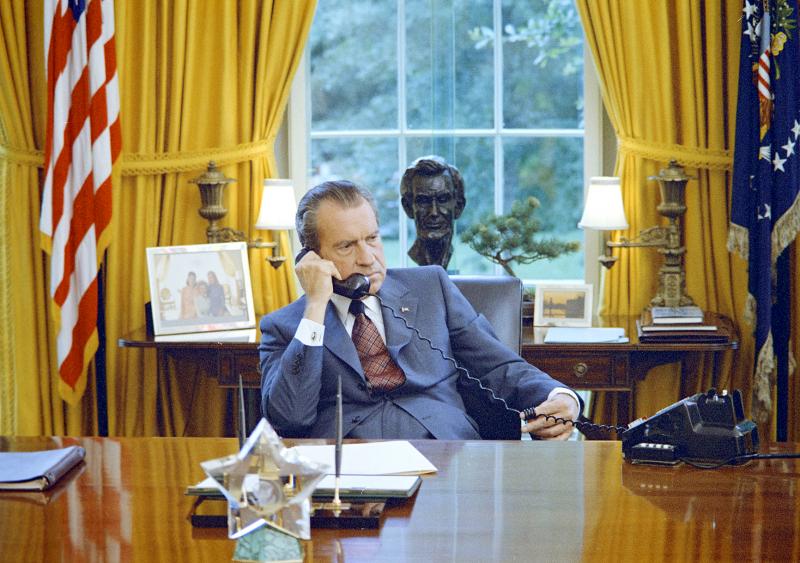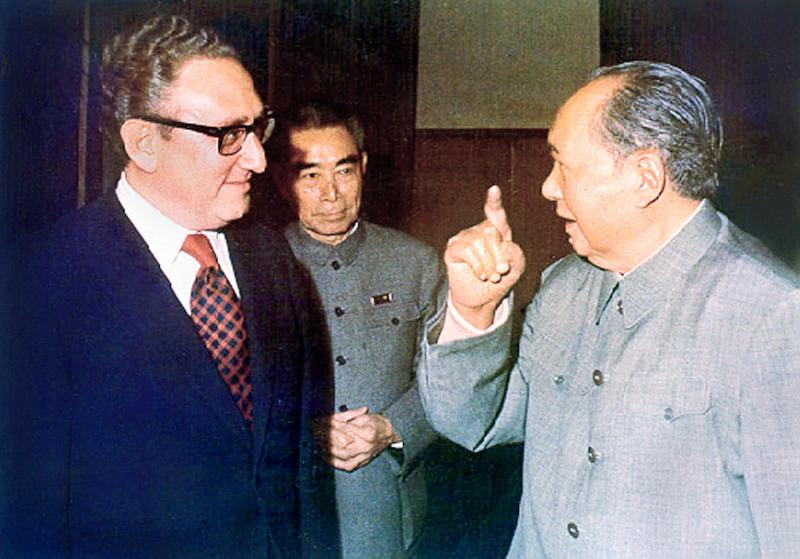US president Richard Nixon had a lot on his mind in the spring of 1971. The Watergate break-in that would ultimately bring down his presidency was more than a year away, but he had a full foreign policy plate with an unpopular war in Vietnam, tensions in the Middle-East and stalled efforts to bring Moscow to the table for talks on limiting nuclear arms.
One other foreign policy challenge, not then publicly known, was the tantalizing prospect of rapprochement with communist China after two decades of estrangement. Nixon and his national security advisor, Henry Kissinger, both believed a breakthrough with “Red China” would increase their leverage in peace talks with the North Vietnamese and arms talks with Moscow.
Something else weighed heavily on Nixon’s mind at that time. Opening up dialog with Beijing might come at the expense of the Republic of China (ROC) on Taiwan. Nixon, who had based his political career on being a staunch opponent of Communism, was a personal friend of the-then 83-year-old Chinese Nationalist Party (KMT) leader Chiang Kai-shek (蔣介石), whom Nixon fondly referred to as “the old man.”

Photo courtesy of Wikimedia Commons
‘WHAT’S BEST FOR US’
In a phone call with Kissinger on the evening of April 14 — the same day TV networks reported on the US ping pong team being invited to China — Nixon expressed his concern over Taiwan’s future.
“The Taiwan thing, that’s sort of worrisome, I don’t know if there’s a damn thing we can do about it, is there?” he asked of Kissinger, who replied: “It’s a tragedy that it had to happen to Chiang at the end of his life, but we have to be cold about it.”

Photo courtesy of Wikimedia Commons
Nixon concurred, adding: “We have to do what’s best for us.”
On July 17, two days after announcing he would make an historic “journey for peace” to Beijing the following year, Taiwan was again on his mind.
“[The president] also brooded some again today, as he does frequently, about the question of how Taiwan can survive now, and that obviously really concerns him,” White House chief of staff H.R. (Bob) Haldeman noted in his diary entry that day.
During his 17 hours of secret meetings with Chinese Premier Chou Enlai (周恩來) in Beijing earlier that month, Kissinger pushed back when Chou tried to link US recognition that Taiwan was “a province of China” as a precondition of Nixon’s visit. However, Kissinger seemed to acquiesce on Chou’s insistence that the visit should set recognition as the “ultimate direction” of US policy.
In his July 14 memo to Nixon on the Chou meeting, Kissinger wrote: “He accepted my position that some time would be required, ie, well into your second term.”
The implication was that, in Nixon’s second term, Taiwan would be abandoned. Haldeman said as much in his July 17 diary entry.
“No promises have been made and no commitments have been made to the Chinese that have to be delivered prior to 1972. But after that, it’s inevitable that Taiwan is going to have to become a province of China or something of that sort. And it does pose a problem especially since the President has been an old China hand from way back — a free China hand, that is,” Haldeman said.
WATERGATE SCANDAL
Although Nixon won the 1972 election in a landslide, the unraveling Watergate scandal would soon consume his presidency and he resigned on Aug. 9, 1974.
In Beijing, communist Chinese leader Mao Zedong (毛澤東) was doing some brooding of his own. Kissinger, who met Mao again on Nov. 12, 1973, noted the chairman’s bafflement at how a “minor incident” like Watergate could cause the “destruction of a strong president.”
“Why is it in your country, you are always so obsessed with that nonsensical Watergate issue? Anyway, we are not happy about it,” Mao said, in slurred speech that was interpreted by his translator.
In the same meeting, Mao admitted Beijing’s relationship with Taiwan was “quite complex,” adding a comment that would have made the US delegation very uncomfortable: He did not believe in a peaceful transition.
“They are a bunch of counter revolutionaries. How could they cooperate with us? I say that we can do without Taiwan for the time being, and let it come after 100 years,” Mao was quoted saying in the official Department of State transcript of the meeting.
Kissinger, who by then was also serving as Nixon’s Secretary of State, replied that the US wanted diplomatic relations with the People’s Republic but that the “current domestic situation” — a probable reference to Watergate, as well as the strong support for Taiwan in Congress — meant that the US could not “immediately sever relations with Taiwan.”
Subsequent high level meetings between US and Chinese leaders would see the same “excuse” given as to why the current administration could not immediately sever relations with Taiwan.
In a meeting with Chinese Vice Premier Deng Xiaoping (鄧小平) on Dec. 4, 1975, Nixon’s successor, president Gerald Ford, said: “We are very grateful that you are understanding of the domestic political situation in the United States.”
When Deng repeated Mao’s earlier assertion that Beijing did not believe in a peaceful transition, and noted Kissinger’s repeated references to Mao’s 100 year time frame, Ford said to laughter: “You can argue that 100 years is a peaceful transition.”
Prior to president Ford’s China visit, Kissinger had met with the Chinese leadership on Oct. 21 that year, accompanied by Ambassador George H. W. Bush and State Department official Winston Lord, who described the meeting as “disturbing,” citing the Chinese perception that the US had become “unreliable” and was a “fading strategic power in the face of Soviet advance.”
Lord’s memo on the meeting, which was handed to president Ford by Kissinger, made the following recommendation on Taiwan: “For now it is better to have the US keep the island under control rather than having it go independent or toward Moscow or Tokyo. The Chinese can wait patiently until the time is ripe, but then they will have to use force ... the US should not ask for peaceful assurances, but it can take its time letting Taiwan go.”
It would be Jan. 1, 1979 before the US would eventually cut diplomatic ties with Taiwan in favor of Beijing, a unilateral move taken by then-president Jimmy Carter, but he too could not ignore the Taiwan-friendly US Congress, which passed the Taiwan Relations Act that ensured the US would provide Taipei with defensive weapons, a move that infuriated Beijing.
Carter only served one term and his successor, Ronald Reagan, was a staunch supporter of Taiwan. During the 1980 election campaign Reagan even threatened to reverse Carter’s decision to cut ties with Taipei, but once in the White House Reagan stuck to the “one China” policy.
In the intervening decades, Taiwan was able to build what has become known as its “silicon shield” — the state-of-the-art semiconductor industry that supplies more than half of the world’s advanced chips — essentially protecting it from the threat of a Chinese military attack.
But the break-in at Washington’s Watergate hotel on June 17, 1972 may well have saved Taiwan from being handed over to China by Kissinger and Nixon.
Craig Addison is writer/producer of Nixon’s China Choice, a podcast docudrama (nixonschinachoice.podbean.com) that tells the behind-the-scenes story of Richard Nixon and Henry Kissinger’s secret diplomacy with China in 1971, and how Taiwan was a pawn in the big game.

As I finally slid into the warm embrace of the hot, clifftop pool, it was a serene moment of reflection. The sound of the river reflected off the cave walls, the white of our camping lights reflected off the dark, shimmering surface of the water, and I reflected on how fortunate I was to be here. After all, the beautiful walk through narrow canyons that had brought us here had been inaccessible for five years — and will be again soon. The day had started at the Huisun Forest Area (惠蓀林場), at the end of Nantou County Route 80, north and east

Specialty sandwiches loaded with the contents of an entire charcuterie board, overflowing with sauces, creams and all manner of creative add-ons, is perhaps one of the biggest global food trends of this year. From London to New York, lines form down the block for mortadella, burrata, pistachio and more stuffed between slices of fresh sourdough, rye or focaccia. To try the trend in Taipei, Munchies Mafia is for sure the spot — could this be the best sandwich in town? Carlos from Spain and Sergio from Mexico opened this spot just seven months ago. The two met working in the

Exceptions to the rule are sometimes revealing. For a brief few years, there was an emerging ideological split between the Democratic Progressive Party (DPP) and Chinese Nationalist Party (KMT) that appeared to be pushing the DPP in a direction that would be considered more liberal, and the KMT more conservative. In the previous column, “The KMT-DPP’s bureaucrat-led developmental state” (Dec. 11, page 12), we examined how Taiwan’s democratic system developed, and how both the two main parties largely accepted a similar consensus on how Taiwan should be run domestically and did not split along the left-right lines more familiar in

This month the government ordered a one-year block of Xiaohongshu (小紅書) or Rednote, a Chinese social media platform with more than 3 million users in Taiwan. The government pointed to widespread fraud activity on the platform, along with cybersecurity failures. Officials said that they had reached out to the company and asked it to change. However, they received no response. The pro-China parties, the Chinese Nationalist Party (KMT) and Taiwan People’s Party (TPP), immediately swung into action, denouncing the ban as an attack on free speech. This “free speech” claim was then echoed by the People’s Republic of China (PRC),